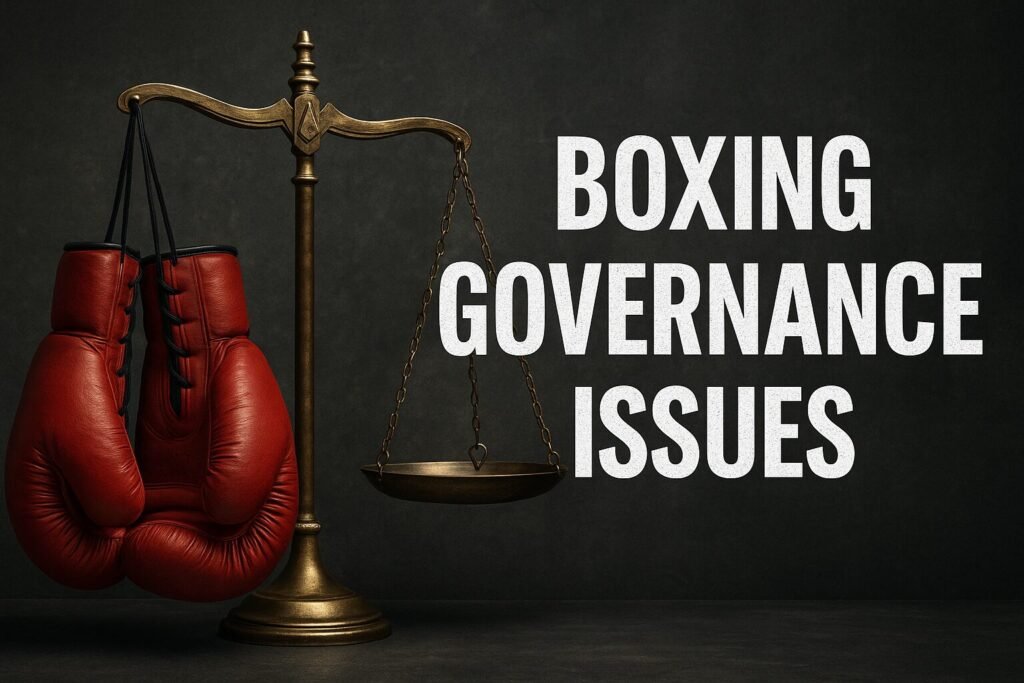Most fighters expect their biggest battles to happen under the lights, not in boardrooms. But the truth is, one of boxing’s most dangerous opponents isn’t a rival with fast hands — it’s poor governance. Boxing governance issues can derail careers just as surely as a bad knockout, and they come in many forms: dodgy licence calls, bizarre title shots, and sanctioning body politics that seem to make the rules up as they go along.
Licence Denials and the Jake Paul Example
Take the ongoing discussion about whether the British Boxing Board of Control should sanction a Jake Paul vs Anthony Joshua fight in the UK. Personally, I think they’d be right to say no. While the fight would generate massive attention (and money), it doesn’t mean it should happen under their jurisdiction — especially when there are clear questions about competitive legitimacy.
The BBBofC has shown before that it’s willing to stand firm. Back in 2012, they refused to sanction the David Haye vs Dereck Chisora grudge match, which ended up being licensed in Luxembourg instead. You can read my full take on the Paul–Joshua licence debate here, but the point stands: sometimes, the right governance call means saying “no,” even if it costs the sport a blockbuster payday.
The Forgotten Challenger: Dillian Whyte
If you want another example of how sanctioning body politics can waste a fighter’s prime, look no further than Dillian Whyte. For four years, he was the WBC’s mandatory challenger — “the man” in waiting — and yet he didn’t get his title shot until it suited the WBC’s timing, not his.
By the time it happened, the landscape had shifted, the momentum was gone, and the whole episode was a lesson in how boxing governance issues can quietly chip away at a career. I covered that story in more detail here.
Title Shots That Make No Sense
And then we have the strange case of Manny Pacquiao being granted a world title fight after years away from the ring. Pacquiao is a legend — no argument there — but the idea that someone can leapfrog active contenders based purely on name recognition shows how murky governance really is.
It’s hard to tell young fighters that rankings matter when sanctioning bodies are happy to tear them up for a superstar comeback. My full thoughts on Pacquiao’s return are here, but it’s another reminder: in boxing, who you are can matter far more than what you’ve earned.
The Bigger Picture: One World, One Champion
Here’s my controversial take: I believe boxing needs one governing body worldwide, not four major sanctioning bodies competing for fees and control. Every country could still have its own board, like the BBBofC in the UK, but there should be a single, central global authority — one world, one champion per weight class.
Yes, it would mean fewer belts to fight for. Yes, promoters would lose some leverage. But it would also mean a clear, unified ranking system, fewer paper champions, and less room for the kind of governance mess that has plagued the sport for decades.
Why This Matters Now
If we keep letting governance operate like this — inconsistent, political, and too often self-serving — the sport will keep losing fighters in their prime to paperwork, politics, and backroom deals. Fans deserve clarity. Fighters deserve fairness. And boxing deserves a system that actually puts the sport first.
What’s your take?
Do you think boxing needs one central governing body, or do the current four sanctioning bodies still have a place? Drop your thoughts in the comments and head over to CMBoxing.co.uk for more straight-talking takes on the sport’s biggest issues.

